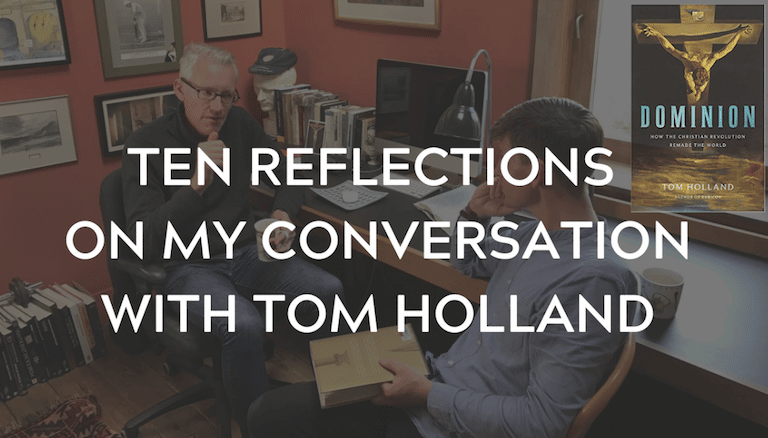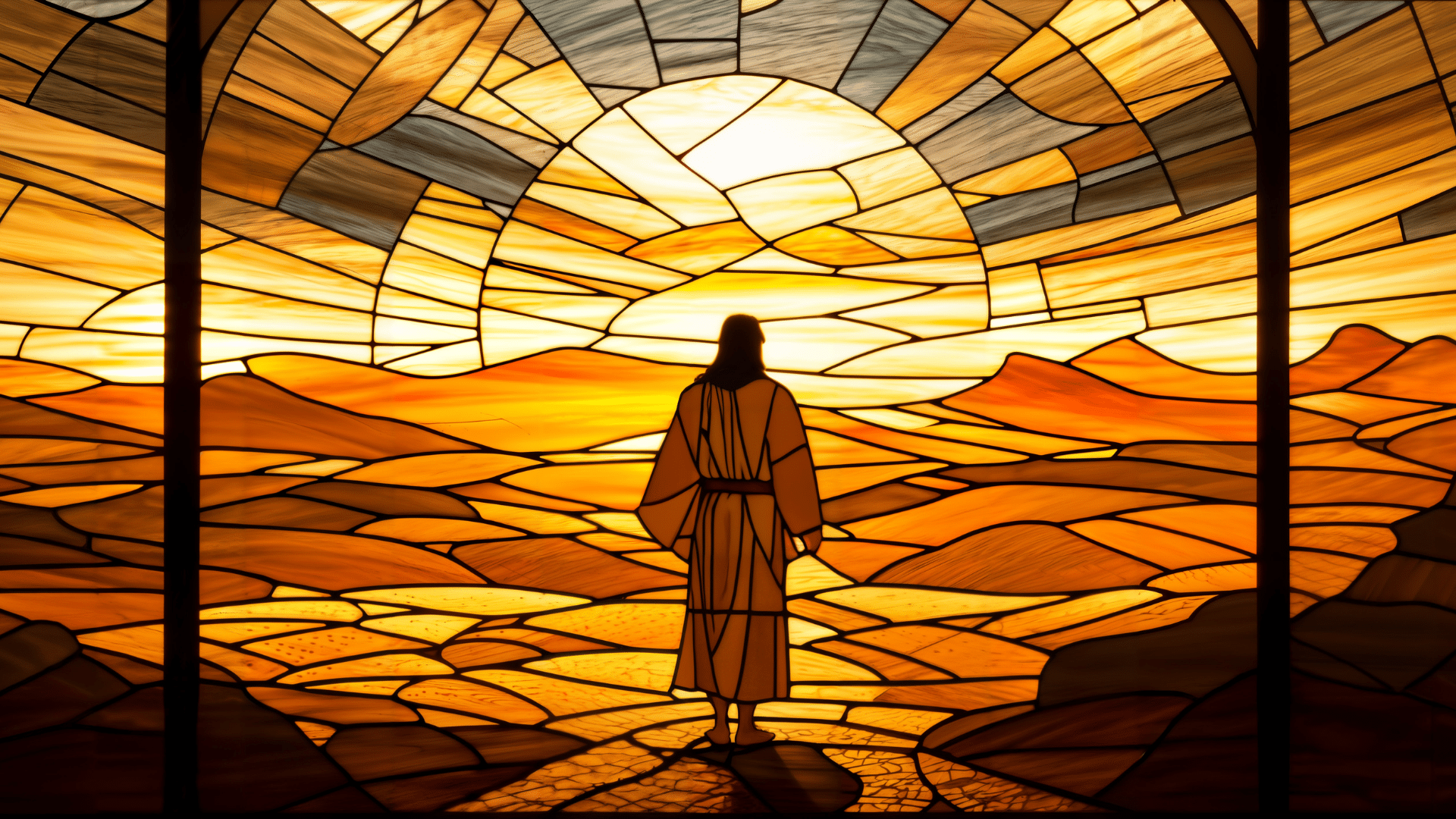Considering Tom Holland’s Dominion — part 1

19th October 2019 // By Glen Scrivener
PART ONE
Last week I interviewed Tom Holland about his new book, Dominion, The Making Of The Western Mind. If you haven’t seen the interview, do watch below.
Below are 6 reflections on the book and on our interaction. (Here are parts two and three).
- Tom Holland gets the ethic of the cross.
If the ethic of the cross means honouring the nobodies, then Tom has understood the cross well. I — a complete nobody — was cheeky enough to ask him for an interview on Twitter and he could not have been kinder or more accommodating. Very Christian!
- Tom Holland gets the theology of the cross.
Holland’s writing and speaking is shot through with astonishment at Christianity’s “molten heart: the image of a god dead on a cross.” The day after our interview I attended his lecture in Cambridge where he spoke about crucifixion among Persians, Romans and ISIS. The historical context brought home the wonder of the God of the cross as few preachers can manage it. Not enough Christians are as focused or as passionate about ‘the molten heart’ of the faith. We can learn much from his writing and speaking.
- Dominion (about Christianity) is a continuation of In The Shadow of the Sword (about Islam).
Throughout Holland’s earlier book, In The Shadow of the Sword, Daniel chapter 2 is repeatedly referenced. It speaks of four cruel kingdoms represented by a statue made of four kinds of material. Eventually they are all overthrown by a simple rock that strikes the feet — the fourth kingdom. (This simple rock seems parallel to ‘the lowliest of men’ in Daniel 4:17 who will eventually mediate the ‘dominion’ of God over all the earth (4:32)). In Daniel 2 this rock grows into a kingdom that fills the earth. In the end it has sole dominion.
Throughout In The Shadow, the identity of these players is kept somewhat ambiguous. Maybe the fourth kingdom is Rome and Islam then is the dominating regime? Maybe Islam is the fourth kingdom and something else takes over? While we contemplate that possibility, Holland gets busy writing a follow-up book about an unlikely victor over the kingdoms of the classical world. In the lowliest way imaginable an unexpected hero sparks a revolution that overtakes the world. And the name of this book? Dominion.
- Dominion is the perfect contrast to In The Shadow of the Sword.
Dominion is, in many ways, the opposite of In The Shadow Of The Sword. Early on in the interview I put this thesis to Tom — he neither endorsed it nor shot it down. I think it’s basically right but I’ll let the viewer decide. The Shadow Of The Sword looks at Islam (something strange to the modern western mind) and demonstrates how it naturally arose from the forces of late antiquity. On the other hand Christianity is natural to our minds — it’s the water we swim in — but its origins are anything but natural. The preaching of the cross was an astonishing “rupture”.
The comparison is instructive. Islam is what you get when you stir the pot of Christian, Jewish, Persian, Roman, Greek and Zoroastrian ingredients. “Christ and him crucified” was folly and weakness to everyone to whom it was preached yet somehow it has proved to be the power of God and the wisdom of God.
To my mind this offers two ways in which Christianity commends itself.
Think about then… Christianity was not natural then (which suggests a supernatural origin).
Think about now… Christianity is natural now (which suggests a supernatural providence).
- There is a huge gap in the book. And that’s deliberate.
Dominion does not engage with issues regarding the historical Jesus. The Gospels are passed over. Holland uses Paul as our earliest source on Christ and leaves alone Matthew, Mark, Luke and John (although he quotes from them continually through the rest of the book, which is interesting!).
Does this mean the historicity of the gospel events is unimportant? You might get that impression as he speaks in terms of Christian ‘myth’. The gospel is, he says, the most potent “myth” humanity has known. But (see from 36:50) he insists:
“I don’t mean ‘mythic’ as an insult. I mean mythic in the sense that… it transcends ideology, it transcends commandments… it’s like drama.”
In the book, Holland leaves it as an open question whether the myth really happened. But his purpose for the book is to underline the power of the myth. If you don’t like the word ‘myth’, substitute the word ‘kerygma’, or ‘preaching’, or even ‘gospel’. Before anything else, Holland wants us to know the unmistakable, epochal, civilisation-building effects of this drama, this myth, this gospel. If we want to know whether the myth happened we’ll have to go elsewhere. But once the intended scope of the book is understood, Holland’s approach is not a weakness. After all, didn’t Pascal say “Make good people wish it were true, then show them that it is”? Well Holland has helped us greatly with that first step.
- Having said this, the avoidance of the Gospels is still, at times, a bit of a dodge.
It’s entirely understandable that Holland might want to save ‘historical Jesus’ questions for another day. He doesn’t need to engage them in order to forward his thesis. Strategically I see the benefits. But at times the avoidance has the effect of making the Gospels seem like another kind of literature, somehow divorced from history itself. It would be an interesting job to count up the sources Holland has depended on for his telling of history from 479 BC to AD 2015. And it would be interesting to calculate the average gap in time between each writer and the events they chronicle. I’ll bet the gospel writers would fare very well indeed by comparison with any of Holland’s ancient sources.
He complains that an author like Luke is writing “too late” but then tells us about Plutarch’s account of Julius Caesar — written around a century later. By comparison you want to start singing Spin Doctors songs on Luke’s behalf: “It’s not late, it’s early!” Certainly the Gospels are later than the Pauline epistles, but both Paul and the evangelists write earlier than the majority of sources on which ancient historians usually rely.
On this historicity question, I asked at one point about the “minimal facts” arguments for the resurrection. In response he compared those arguments to claims that Mohammed encountered the angel in the cave and brought divine revelation to the world. I don’t think the comparison holds for a number of reasons. First, as Paul says (though we only have Luke’s word for it!), the gospel events “were not done in a corner” (Acts 26:26). A private encounter with an angel is not at all like the public execution of Christ, nor like the public proclamation of his empty tomb. Secondly, the Quran is unlike the New Testament in that the Quran is explicable as a natural outcome of the confluence of forces in late antiquity. The New Testament is the report of a “rupture”, a “singularity”, “astonishing.” It’s really not the same (see point 4). Thirdly, as Holland elsewhere notes, the comparison between Islam and Christianity is not really between the Quran and the Bible, but between the Quran and Christ. The Bible for Holland is the spike on the seismograph. Christ himself (or the Christ ‘event’) is the real history-maker. The ways of investigating Muslim and Christian claims are quite different. And therefore we can’t just file away the evidence for the resurrection in a category along with very different Muslim claims. Jesus’ cave is not like Mohammed’s.
In future posts (here and here), read my final four reflections…
- Holland does help us immensely with the historicity question.
- Holland is very aware that history is crucial to the faith.
- It’s either Christ or the abyss.
- Tom’s objection to personal faith is, itself, very Christian.
